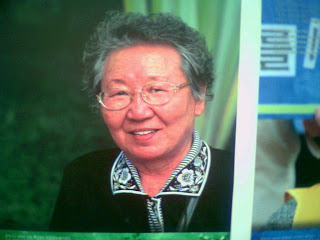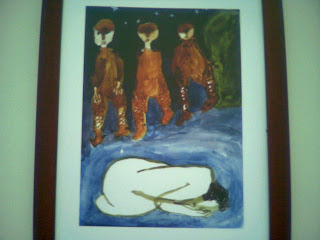Here's another example, one that cuts both ways, from where I see it.
(Leading in:) After World War II, the US came clean on the Japanese internment camps they'd run, made reparations, made a public, official apology, and so made it possible to start healing. Germany did the same in Europe regarding the holocaust, making it possible to normalize relations between them and the other countries of the EU.
Over in East Asia, though, relationships between Japan, China and Korea are strained these days because Japanese history books and politicians are smoothing over, or flatly denying a pair of disgusting blots on Japan's wartime history.
There was a huge civilian massacre in Nanking during the war, the seriousness, and the very veracity of which Japan has disputed, and Japanese soldiers also kidnapped hundreds or maybe thousands of young women out of their villages in the territories they occupied during the war (Korea, China, Indonesia, etc.), housed them outside the soldiers' camps, and basically forced them to be sex slaves for the duration of the war. They were euphemistically called "comfort women" because that sounds better than "sex slaves" or "rape-bunnies". Japan's politicians have been saying that these women went voluntarily, or that they were amply compensated. Nationalist Japanese politicians are grumbling "I'm about fed up with being asked to apologize" when nobody's ever owned up to it specifically, and
Japanese history textbooks have been de-emphasizing or trivializing such events. The Japanese emperor made a number of blanket apologies and such after the war, but Japan has refused to make the kinds of reparations and official statements necessary to allow China and Korea to move on . . . and when they HAVE made apologies, they've often been loaded with vague words, and evasive qualifiers, not ratified by any official bodies, or (former Prime Minister Koizumi caught a lot of flack for this) immediately after apologizing, the apologizers went and paid respects at a war memorial that honoured, among the others, dead war criminals.
At the same time as it refuses to come clean on its own war atrocities, Japan is campaigning to become a permanent member of the U.N. security council. Is there something wrong with this picture? Could anyone seriously trust Japan in concerns of world stability when it won't even play straight with its own history?
Michael Honda is the American politician who led a resolution through congress formally urging Japan to come clean, and he says, among other things (read the article) that "If you want to be a global leader, you have to first gain the trust and confidence of your neighbors."
Here's one article about Japan's comfort women history.
Here are some pictures of former comfort womenI saw in a display outside Seoul's City Hall about the comfort women. Many of them were ostracized as "damaged goods" when they came back to Korea, and never married.

This next one especially breaks my heart because her face reminds me of my mom. It could have been anyone's mother -- that's the shocking thing about it.

Here's a painting that expresses the terror and degradation pretty clearly.
 And here's the article about Michael Honda.
And here's the article about Michael Honda.
On the other hand, Korea has its own problems with moral authority: Koreans cry for an apology and compensation to the surviving comfort women (and their numbers are dwindling as many pass on from old age). It's a shame that Korea waited so long to begin campaigning for their vindication (the comfort women issue was hidden like a shameful secret until the 1990s), but the Korean agitation for an apology is toothless, in my opinion.
You see, the Korean government's refusal to enforce their own laws against prostitution cut Korea's protests to Japan off at the knees. How can Korea claim any moral authority, how can their criticism that Japanese soldeirs violated these young women's basic human dignity hold any water, when it's still common for Korean businessmen to visit "business clubs" and "massage parlours" and "barber shops" where the services for sale degrade the women forced to work there? Sure, there isn't a gun to
these women's heads, but it doesn't wash for Korea to demand recompense for women who were degraded in the past, when Korea today STILL degrades their own women through the sex industry, and even the government turns a blind eye to it (after passing some token laws to divert international criticism).
Some links about prostitution in Korea from a site that translates articles in Korean newspapers.
sdfsdfsd
sdfsdfsdf
sdfsdfsdf
sdfsdfsdf
South Korean movers and shakers also find themselves suddenly looking at the floor, afraid to confront anyone about anything, when faced with topics like this.
It's common here for Russian or Indonesian or Philippino women to come to Korea to work in the lucrative sex trade: travelling to Korea and selling herself for a year will bring a woman enough profit to support her family back home for two more years! The "entertainment" districts are well known in Seoul (Mia, Chongnyangni, Yongsan, there was one in Bangi-dong where I lived before; there are many more), and range from places where you can pay for a woman to simply entertain you (a little like a geisha in Japan - she'll sing and converse and pour your drinks), to (in and) outright brothels. Though it's getting better in recent years, it's common enough that a few years ago, there was actually a campaign where an organization was handing out free movie tickets as an alternative to bosses taking their employees to "business clubs" for their Christmas bonuses. It's never spoken in polite company, but a student told me (and the male student who'd completed his military service turned red, but didn't deny) that when a Korean man is about to begin his military service, a common initiation custom is for his friends, or his senior soldiers, to take him to a brothel, if he's still a virgin, and make sure he loses his cherry before he goes out defending his country! Korea's stand on comfort women doesn't wash to me, because their own record for defending the human dignity of women over in Chongnyangni is pretty poor, while Japan's petition to become a permanent member of the security council rings hollow, too, because of their denial of the past.
All this is not to say that the speaker's character is the ONLY concern in discourse -- the fact Nietsche died in an asylum doesn't mean his ideas aren't worth serious consideration, and the fact some particular writer/poet/politician/artist was gay/a pedophile/rude/a plagiarist doesn't mean we can ignore their ideas completely (the ad hominem attack is an ancient, and petty trick). Shakespeare's sexual orientation has no effect on his genius, and more than a big nose would have!
But in certain arenas, especially those on a national and international scale, where practical action is required, and where a lot of people are affected by movers' and shakers' opinions and decisions, and
especially in cases where the people effected by those decisions have little or no power, or voice, or wealth, I think one DOES need to look at the entirety of a group's choices and decisions, sniffing around for ulterior motives, in order to lend them credence. If Nike is planting trees to make up its carbon debt, that's good, but they're STILL running sweat shops in Cambodia. Megaphones and mufflers! I wrote in one of my notebooks in highschool (I'm not sure if I stole this from somewhere or not, but. . . ) "Our words show what we want to be; our actions show what we are."
What say you?



